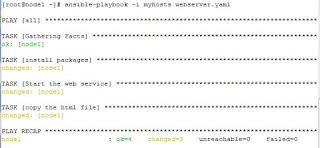Yum module in Ansible | Normally to install ,upgrade or remove a
package we use yum command in linux
operating system .Similarly when we are going to install a package using
Ansible we use yum module. Through this module we can install, upgrade and
remove our required packages.
How to update all packages in ansible
To update all packages at a time we use ‘*’ symbol in the name parameter in Ansible and you must mention the state to latest to update all packages.
- hosts: node1
tasks:
- name: Upgrade all yum packages
yum:
name: "*"
state: latest
tasks:
- name: Upgrade all yum packages
yum:
name: "*"
state: latest
If you want to update all packages except some package you must specify ‘exclude’ parameter which contains which packages you don’t want to update.
In the below example we want to update all packages except php package.
- hosts: node1
tasks:
- name: Exclude some packages for upgrade
yum:
name: "*"
state: latest
exclude: php*
tasks:
- name: Exclude some packages for upgrade
yum:
name: "*"
state: latest
exclude: php*
How to install a package in Ansible
You can install a package in Ansible
using yum module.Under this yum module there
are two arguments one is name and another is state.
Name:
name of the package which is to be installed.
State:
state of the packages. By default state of the package set to present. when we
are going to upgrade a package the state will be latest. when we are going to
remove a package the state will be
absent.
For
an example we install httpd package.
---
- hosts:
node1
tasks:
- name: Install package
yum:
name: httpd
state: present
tasks:
- name: Install package
yum:
name: httpd
state: present
 |
| Install Package in Ansible |
How to install a specific version of package
To install specific version of package we have to mention the version of the the package in the name argument along with package name.
- hosts: node1
tasks:
- name: Install specific version of a package
yum:
name: httpd<package version>
state: present
tasks:
- name: Install specific version of a package
yum:
name: httpd<package version>
state: present
How to install the latest version of package in Ansible
When we are
going to install latest version of package we have to set the state to latest
and in the name argument set the package name.
Name:
name of the package which is to be installed.
State: state of the packages. By
default state of the package set to present. when we are going to upgrade a package
the state will be latest. when we are going to remove a package the state will be absent.
For an example we install httpd package
in latest version.
- hosts: node1
tasks:
- name: Install latest yum package
yum:
name: httpd
state: latest
tasks:
- name: Install latest yum package
yum:
name: httpd
state: latest
How to install multiple packages in ansible
To
install multiple package we use with_item module and state should be present.
You
can set the state to installed instead of present.The functionality of the both
is same.
In
the below example we install lamp stack
- hosts: node1
tasks:
- name: yum
yum:
name: "{{ item }}"
state: present
with_items:
- httpd
- php
- mysql
tasks:
- name: yum
yum:
name: "{{ item }}"
state: present
with_items:
- httpd
- php
- mysql
How to delete a package in Ansible
You can remove a package in Ansible
using yum module.Under this yum module there
are two arguments one is name and another is state.
Name:
name of the package which is to be installed.
State:
state of the packages. By default state of the package set to present. when we
are going to upgrade a package the state will be latest. when we are going to
remove a package the state will be
absent.
For
an example we remove httpd package.
---
- hosts:
node1
tasks:
- name: Install package
yum:
name: httpd
state: absent
tasks:
- name: Install package
yum:
name: httpd
state: absent
If this article is helpful to know about Yum module in Ansible please share this article.

0 comments:
Post a Comment